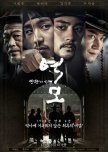
Michiru is a woman who lost her sight in a car accident, living with her father in a house near a train station. But her father suddenly dies and Michiru decides to live alone. Every morning, Michiru listens to the sound of express train passing through the station. One day, Michiru notices the sound of the train is different from the usual one. On TV, news tells that there was a train accident which killed a man and is suspected to be a murder. And some time later, her door bell rings. A man is standing in front of her house. She can sense someone is there, but he does not answer. He succeeds in slipping in to her house without being noticed by Michiru. The man's name is Akihiro. He is the person, on TV, who is being suspected to be the murderer of the train accident that day. Akihiro, after sneaking in to her house, heads to the window where he can see the train station where the accident happened. Who is Akihiro? Is he really the murderer? Will Michiru be safe in her house alone with a stranger? Thrilling and strange life of Michiru and Akihiro begins.



Former acclaimed dancer Na Young Sae attempts to make a comeback. Young Sae then brings to Korea Jang Chae Rin, an ethnic Korean from China who he presumes is a highly talented dancer. To Young Sae's surprise, he soon learns Chae Rin is an inexperienced dancer and her older sister is the talented dancer. With only three months until the Dance Championship, Young Sae attempts to turn Chae Rin into a world-class dancer.

A Tokyo suburb with a middle American feel, the city of Fussa is home to a US military base with its wide avenues, second-hand clothing stores peddling American merchandise and bars catering largely to G.I.s.
Shiro is a 17-year-old Fussa native, fresh from high school graduation, who finds himself standing in that ambivalent "no man's land" between adolescence and adulthood, ready to strike out on his own but uncertain whether to trust his underdeveloped instincts. He shirks off college, much to the dismay of his conventional parents who barely register in his life, and takes a job at a gas station for no other reason than a vague ambition to do something with cars. For guidance and moral support, Shiro turns to his offbeat, septuagenarian grandmother, "Fujiko", a perennial "flower child" and pro-American who owns a local watering hole and celebrates life with a romantic corps de esprit that she's preserved since her halcyon youth. It is "Grandma" who wields the greatest influence on Shiro's spiritual and moral upbringing and she takes to the role of mentor with the passion of a sacred mission. "Working at a gas station's a great idea, " she tells him. "So full of romance. A rest stop for life's drifters. I'll handle your father on this one."
While Shiro still races around town on his bicycle and rents porn flicks with his boyhood pals, he's keenly reminded that this part of life is quickly ending when he sees his two best friends willingly trade in their childhood pursuits for college and "true love" ? of the same girl. "I've yet to know what that feels like," confesses Shiro, who has a sense of the vital role love plays in a person's coming of age but feels personally removed from it. Like a self-fulfilling prophecy, however, Shiro stumbles across a public breakup scene one evening between a man in a white car and a college girl, Noriko. Days later, Shiro is surprised to see the same girl arrive at the gas station as the newly-hired help, and even more alarmed at his loss of composure in front of her. He is love-struck, and his bittersweet initiation into adult life begins.
Shiro is a 17-year-old Fussa native, fresh from high school graduation, who finds himself standing in that ambivalent "no man's land" between adolescence and adulthood, ready to strike out on his own but uncertain whether to trust his underdeveloped instincts. He shirks off college, much to the dismay of his conventional parents who barely register in his life, and takes a job at a gas station for no other reason than a vague ambition to do something with cars. For guidance and moral support, Shiro turns to his offbeat, septuagenarian grandmother, "Fujiko", a perennial "flower child" and pro-American who owns a local watering hole and celebrates life with a romantic corps de esprit that she's preserved since her halcyon youth. It is "Grandma" who wields the greatest influence on Shiro's spiritual and moral upbringing and she takes to the role of mentor with the passion of a sacred mission. "Working at a gas station's a great idea, " she tells him. "So full of romance. A rest stop for life's drifters. I'll handle your father on this one."
While Shiro still races around town on his bicycle and rents porn flicks with his boyhood pals, he's keenly reminded that this part of life is quickly ending when he sees his two best friends willingly trade in their childhood pursuits for college and "true love" ? of the same girl. "I've yet to know what that feels like," confesses Shiro, who has a sense of the vital role love plays in a person's coming of age but feels personally removed from it. Like a self-fulfilling prophecy, however, Shiro stumbles across a public breakup scene one evening between a man in a white car and a college girl, Noriko. Days later, Shiro is surprised to see the same girl arrive at the gas station as the newly-hired help, and even more alarmed at his loss of composure in front of her. He is love-struck, and his bittersweet initiation into adult life begins.






Black Cat is described as a light rom-com series Im Si-wan playing the mysterious lead character Ji-baek. L plays the hot top star (essentially himself) Ho-yeon, who has a kind personality and takes special care of the heroine, Mi-oh. That role will be played by Chae Soo-bin, and she’ll get caught up between both boys in a love triangle.


Soon after he lands in America, Ali, a Muslim man from Pakistan, begins his search for his estranged wife, Nadia. On his journey, Ali meets with Teppei, a Japanese traveller hitchhiking his way across America, and Sarah, a local trailer park girl, who help him in his search. The three travellers succeed in finding Nadia, who, to Ali’s dismay, is living a new life in Phoenix with another man. Ali spends the rest of his stay in America with Teppei and Sarah, anxiously wondering where his life is leading. In the brief time they are together, the three companions commit to helping one another. Ali, Teppei and Sarah begin a new journey, to find their own individual identities and in the process they find each other. Big River is a road movie, a tale about the borderless realm of friendship and its ability to transcend culture.




































